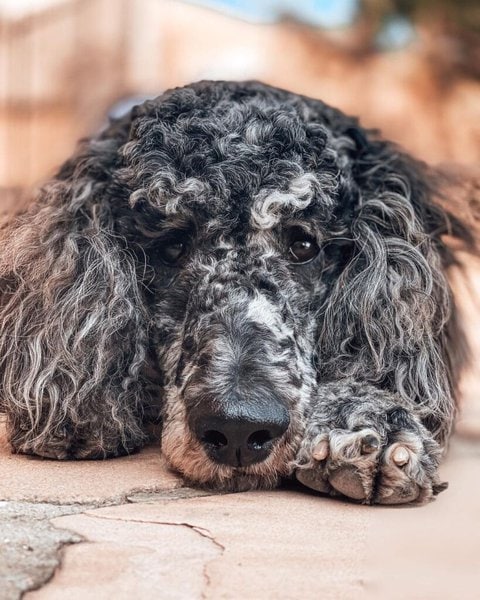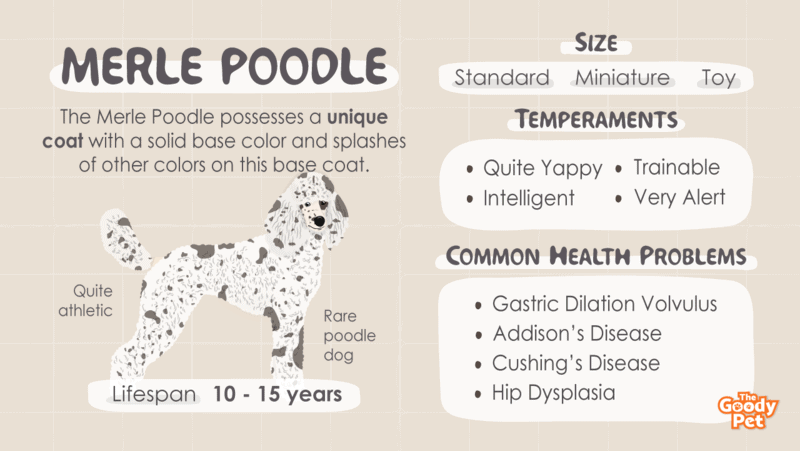Of all the available Poodle coat colors and patterns, one pattern that never fails to turn heads is that of the rare Merle Poodle, and you only need to take one look at this pooch to understand why. Now, what is a Merle Poodle?
A Merle Poodle is a variant of the popular Poodle dog that possesses a unique coat with a solid base color and splashes of other colors on this base coat. The merle coat pattern is considerably rare, and there remains a question over whether it is naturally occurring in the Poodle dog.
Apart from the unique coat pattern, Merle Poodles are very much like regular Poodles, and they require the same maintenance procedures as their counterparts. Today’s article focuses on how to care for a Merle Poodle, as well as the temperaments and common health issues of this pooch. But firstly, let’s see how rare the Merle Poodle is and the distinctive physical characteristics of this pooch.
Are Merle Poodles Rare?
The distinct color pattern, which consists of a solid base color with patches throughout the coat that is present on the Merle Poodle, is quite rare for a Poodle dog.
That said, if you were to come across a Merle Poodle, it will most likely sport a coat with a black or gray base and white, light gray or, in extremely rare cases, blue speckles. It is also possible for Merle Poodles to have brown coats with a light red pattern.
Appearance
Apart from the difference in coat colors, there isn’t much difference between the physical appearance of Merle Poodles and regular Poodle dogs.
Merle Poodles boast a square-shaped body outline, with long faces, drooping ears, and a long, elegant neck contributing to this pooch’s regal appearance. This Poodle also tends to have long legs with a docked tail.
Most times, Merle Poodles have either completely blue or partly blue-colored eyes, although it is quite possible to have other eye colors.
The most distinctive feature of the Merle Poodle is its signature cotton candy coat with textures ranging from coarse to extremely soft. The Merle Poodle’s coat can either be corded or curly, but you can also identify this pooch via its signature clipped coat.
Size
Merle Poodles are typically produced in three size variants – toy, miniature, and standard – but these varieties are considered to be part of the same breed.
Toy Merle Poodles typically weigh between 5 to 10 lbs and stand just under 10 inches at shoulder level.
Miniature Merle Poodles weigh between 12 to 15 lbs, with heights that range between 10 to 15 inches at shoulder level.
Standard Merle Poodles are the largest of the size variants, and they usually weigh between 40 to 55 lbs when fully grown, with a height of over 15 inches at shoulder level.
Is A Merle Poodle Purebred?
The argument on whether or not it is possible for a Poodle to be born naturally with a merle coat is one that has continued to rage on over the years.
Proponents of the merle Poodle argue that this coat pattern may have developed due to mutations in the Poodle’s genes over the years. And on the other hand, anti-merle advocates argue that the Merle coating on Poodles is a result of unnatural breeding practices over the years.
That said, most professional dog bodies, including the American Kennel Club (AKC) and the United Kennel Club (UKC), do not recognize merle as an official Poodle color.

Do Merle Poodles Have Health Problems?
The average Merle Poodle is generally expected to live for between 12 to 15 years.
Merle Poodles are relatively healthy dogs; however, just like all other dogs, this pooch is predisposed to several medical conditions that may either be genetically inherited or due to poor quality of life.
That said, some of the health challenges that a Merle Poodle may face during its lifetime include:
Addison’s Disease
Medically referred to as Hypoadrenocorticism, Addison’s disease is a critical medical condition that signifies inadequate production of the adrenal hormone by Merle Poodle’s adrenal gland.
This insufficient production of the adrenal hormone typically results in major changes in the Merle Poodle’s body function, and this can degenerate to problems with the dog’s heart and circulatory system.
What makes Addison’s disease even more difficult to deal with is the fact that its symptoms are usually non-specific. And a medical diagnosis during the acute stage of the disease is the only way to tell for sure that Merle Poodle’s adrenal gland isn’t working properly.
Gastric Dilatation Volvulus (GDV)
Commonly referred to as Bloat, GDV is a medical condition that is characterized by the Merle Poodle’s stomach rapidly filling up with either food, gas, or fluid. And this, in turn, leads to a sharp drop in the dog’s blood pressure.
This rapid filling of the Poodle’s stomach is usually caused by either the Pooch eating too much too quickly, drinking too much water after eating, or engaging in vigorous exercise after eating. And if left without immediate medical attention, bloat can be fatal for a Merle Poodle.
Cushing’s Disease
Contrary to Addison’s disease, Cushing’s disease in Merle Poodles occurs due to the overproduction of the hormone cortisol.
Cushing’s disease in Merle Poodles is usually caused by either a pituitary gland tumor, adrenal gland tumor, or due to the prolonged use of steroids. And without proper medical attention, this medical condition can significantly decrease Merle Poodle’s quality of life.
Hip Dysplasia
Hip dysplasia in Merle Poodles typically occurs as a result of the poor formation of the pooch’s hip socket, which results in the thigh bone sliding out of its natural position atop this hip socket.
Most times, hip dysplasia in Merle Poodles is genetically inherited, and its effects on the pooch are only amplified by the dog’s environment. If left unchecked, hip dysplasia can degenerate into arthritis and eventual lameness.
Other Health Problems
Apart from those listed above, Merle Poodles are also predisposed to medical issues such as:

How To Take Care Of Merle Poodles?
Diet
Merle Poodles need to be fed a well-balanced diet that is rich in quality animal protein, and which is complemented by an appropriate level of healthy fats, carbohydrates, vitamins, and minerals.
Dry kibble is the more common and cost-effective way of ensuring that Merle Poodles get sufficient nutrition. But you can also feed your Merle Poodle high-quality wet dog food like Pet Plate, provided it contains all the nutrients essential for the Poodle’s physical development.
Also, given that Merle Poodles typically come in different sizes, you can also take advantage of Pet Plate’s special meal customization features by submitting your pooch’s physical characteristics to get a custom-made diet.
Homemade meals are also acceptable in feeding a Merle Poodle, but you should consider the use of supplements to make up for any nutrients that may be lacking in such meals.
You should also ensure that the Merle Poodle’s drinking bowl is always filled with a supply of fresh and clean water. And if you’re feeding the Poodle wet food, you can invest in dental water additives to promote oral health.
How Much Should You Feed A Merle Poodle?
The appropriate amount of food for a Merle Poodle depends on the size classification of the pooch in question.
Standard Merle Poodles typically require between 1½ to 3 cups of high-quality, dry dog food per day, while miniature Merle Poodles will do just fine with about ¾ to 1 cup of food per day. For a Toy Poodle, the amount of food needed typically falls between ¼ to ½ cup of food per day.
The Merle Poodle’s meals also need to be spread out into 2 to 3 meals per day, depending on the Pooch’s age. Merle Poodles will take on an unhealthy weight if overfed; hence, you have to be strict about feeding this pooch.
Exercise
Contrary to what you may expect, Merle Poodles are quite athletic, and they require a considerable amount of exercise to stay physically fit.
The recommendation is that adult Merle Poodles get a minimum of 60 minutes of exercise per day. And this can be in the form of two brisk walks early in the morning and late in the afternoon.
Poodles were originally bred to be hunting dogs; hence, games that involve chasing down and retrieving an object provide both great physical exercise and mental stimulation for the Merle Poodle.
Additionally, Merle Poodles absolutely love swimming and this can provide a great form of low-impact exercising for the pooch.
Are Merle Poodles Yappy Dogs? Temperaments Of Merle Poodles
Merle Poodles retain most of the personality attributes of the regular Poodle dog, and have been described as loving dogs that are fiercely loyal to their family members.
Despite making great lap and companion dogs, Merle Poodles can be quite yappy; hence, you should be prepared to engage in a fair bit of conversation with your furry friend.
Its adaptability allows the Merle Poodle to adjust fairly well to living in either a small apartment or a big home. That said, they are quite sensitive dogs and typically don’t react well to being left alone at home for considerable periods.
Merle Poodles make incredible companions for kids, and they are also accommodating of other dogs and pets. However, Merle Poodles can be injured when rough-handled; hence they are better suited to homes with older kids that know how to handle dogs.
The Merle Poodle is quite friendly, and while this pooch has a reputation for being calm and docile, it also won’t turn down an opportunity to jump and play around the house or outdoors.
Intelligence
Merle Poodles are popular for their outstanding levels of intelligence, with several studies placing this pooch among the top three most intelligent dog breeds in the world.
This high level of intelligence also means the Merle Poodle has a propensity for mischief, with a tendency to get into sticky situations; hence, this is one pooch you’ll have to monitor at all times.
Security
While the Merle Poodle makes for a great family dog, this pooch is not the best option to guard and protect the home and properties.
A Merle Poodle is naturally very alert and won’t hesitate to bark to warn its owner of an intrusion. But this pooch lacks the aggression that is necessary to effectively carry out its protective duties.
Training
As stated earlier, the Merle Poodle is very intelligent, and when you combine this with the pooch’s inherent athleticism, you have a highly trainable dog.
Most Merle Poodles can learn a new command in five or fewer repetitions. And this, coupled with the Poodle’s eagerness to please, is why it’s easy to teach this pooch basic and advanced commands, crate, leash or house train, and agility moves.
Also, the Merle Poodle relies heavily on its owner’s seal of approval; hence, positive reinforcement for acts of obedience will go a long way in making training sessions even easier.
You do need to be careful when training the Merle Poodle, as this pooch can easily pick up on both good and bad habits and remember such for a long time. Also, due to their higher intelligence, Merle Poodles may get bored during training sessions; hence, it may be helpful to keep such sessions short and impactful.

Do Merle Poodles Fade? Grooming Tips For Merle Poodles
Merle Poodles do not fade, and if you own one of these rare pooches, then you can rest assured that it’ll maintain its unique coat pattern for life. However, as the Merle Poodle grows older, you may possibly notice the growth of gray hair in the black patches on its coat.
Despite being able to grow long hair, the Merle Poodle is a low-shedding dog breed, and this pooch is a great hypoallergenic dog for those with canine allergies.
That said, if you plan to get a Merle Poodle, then you should be equally prepared to devote a considerable amount of time to grooming, as the Poodle is a high-maintenance dog.
Brushing
The Merle Poodle typically needs to be professionally groomed every three to six weeks, with daily brushing needed to maintain the coat’s polished look.
Apart from keeping the coat from becoming matted, brushing your Merle Poodle’s coat with a quality brushing tool like the FURminator Undercoat Tool will help in getting rid of loose undercoat hair.
This tool makes brushing your Poodle’s coat a breeze thanks to an ergonomic handle design that is comfortable to hold. And the brush’s curved blade design makes it easy to reach beneath the Poodle’s topcoat to trim loose hair.
Bathing
Generally, it is recommended that you bathe your Poodle every two to three weeks, but this duration can be considerably shorter if the pooch’s coat gets dirty before the next scheduled bath.
Merle Poodles have sensitive skin; hence you should make sure to bathe this pooch only with dog-friendly shampoo products like the Seamus Cherry Blossom Whitening Dog Shampoo.
Apart from being gentle on the sensitive Merle Poodle skin, the Seamus shampoo also improves the dog’s coat texture and leaves the pooch with a pleasant Cherry Blossom scent.
Additional Grooming Tips For Merle Poodles
Apart from brushing and bathing a Merle Poodle regularly, as the occasion demands, some other grooming practices that should be carried out on a regular basis include:
- Wiping the pooch’s face to prevent the formation of tear stains.
- Checking your Poodle’s ears for dirt and signs of infections.
- Brushing the Poodle’s teeth frequently to prevent tartar build-up.
Related Questions
How Much Do Merle Poodles Cost? Merle Poodles are considerably expensive, and it will cost you an amount between $800 to $4,000 to acquire one of these rare pooches from a registered breeder. The amount you’ll ultimately spend to purchase a Merle Poodle depends largely on the size of the pooch in question, with standard-sized Merle Poodles costing significantly more than the other size variants.
Can You Breed Two Merle Poodles? It is possible to breed two merle poodles, and one probable outcome of this breeding process is a Poodle with a double merle coat. Double merle poodles typically end up having a predominantly white coat which places the pooch at a higher risk of suffering from various sight and hearing impairments.
Can Merle Poodles Naturally Swim? The Poodle is widely regarded as one of the best swimming dog breeds. And the Merle Poodle, just like the regular Poodle dogs, boasts the ability to swim with ease. Merle Poodles are particularly good swimmers, no thanks to a dense, single-layered coat and a webbed paw that makes it easy for the pooch to navigate in water.





